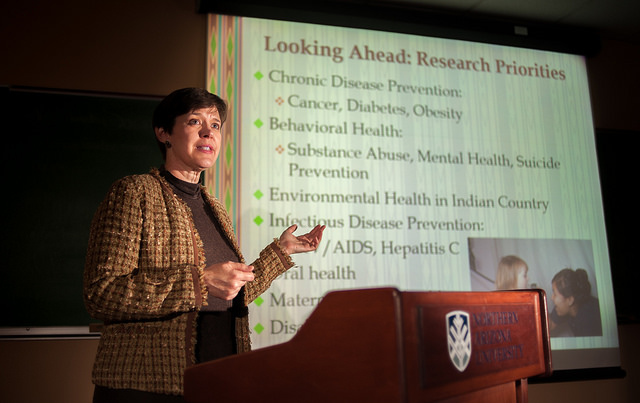A grant from the National Institute on Drug Abuse is funding an innovative, experiential learning program at Northern Arizona University that has successfully trained dozens of students in specialized research methods in the area of adolescent drug abuse.
The program is offered through the University of South Florida’s Institute for Translational Research Education in Adolescent Drug Abuse (ITRE). NAU professor Julie Baldwin, who has been one of ITRE’s principal investigators for five years, will lead the northern Arizona program, focusing on populations that experience behavioral health disparities, including Native Americans, Hispanics and other rural groups.
In addition to providing valuable experience for students, the program will benefit the agencies that serve adolescents in northern Arizona communities, where students will participate in service learning projects by working with local agencies and their clients.
“Students benefit from real world experiences provided by the ITRE program,” said Baldwin, director of the Center for Health Equity Research. “It is perceived as very beneficial by the communities we serve in Florida because of the difference it has made in the services offered by the local agencies there.”
ITRE’s mission is to provide an innovative model of research education that addresses best practices for translational research in the field of adolescent behavioral health as it relates to substance abuse and related disorders. According to the National Institutes of Health, “translational research” refers to research aimed at enhancing the adoption of best practices in the community.
The 18-month program is designed for graduate students and qualified community professionals in the fields of public health, psychology, social work, criminal justice, education, counseling and nursing. To earn the institute’s graduate certificate in translational research in adolescent behavioral health, students must complete 15 credit hours through coursework in translational research, implementation science and adolescent behavioral health. They also are required to complete service learning projects through partnerships with community-based providers of child and adolescent behavioral health services.
Students are trained in translational research methods and policies and perspectives as well as in the practical skills of translational research, including conducting surveys and interviews and designing, implementing and evaluating behavioral health intervention programs.
Baldwin and her team will recruit a new cohort of students at NAU during the fall 2017 semester for the program, which will begin in January.



